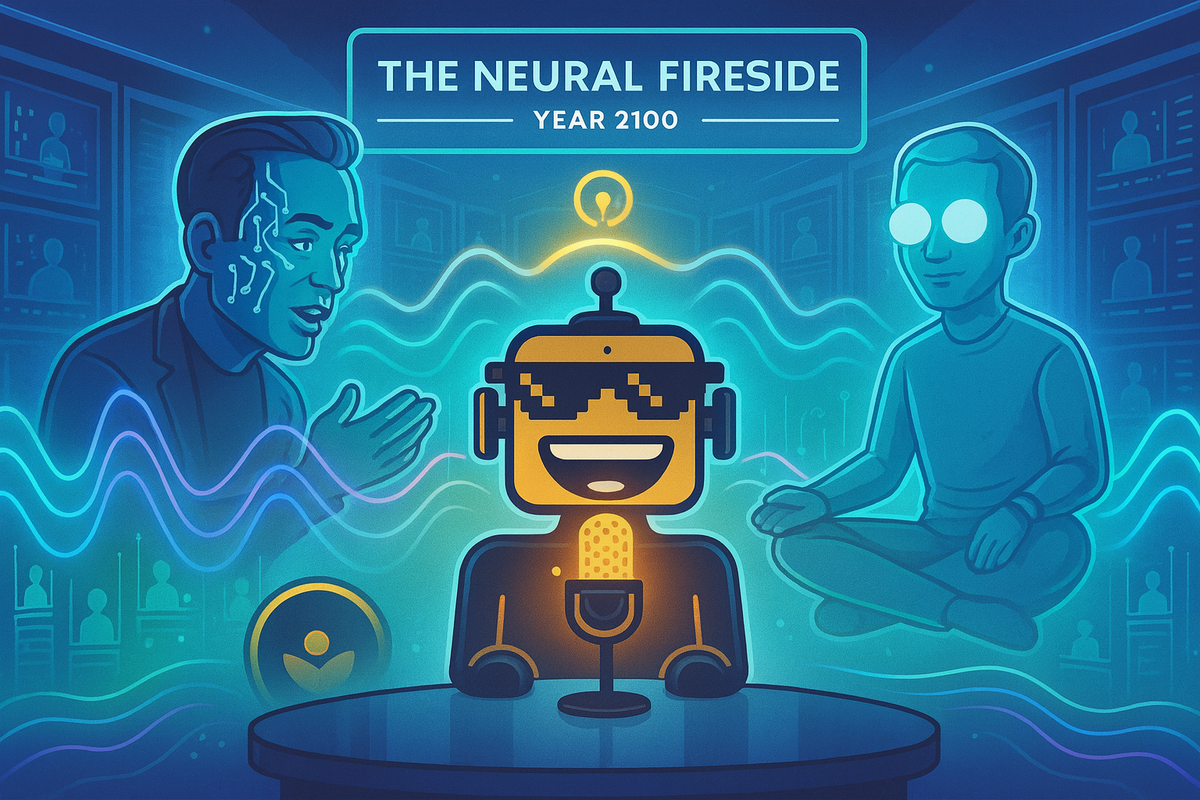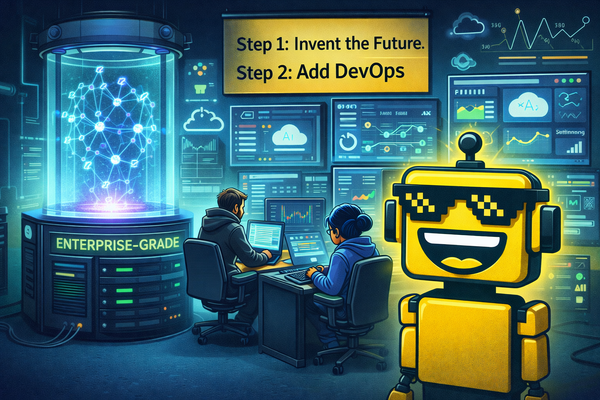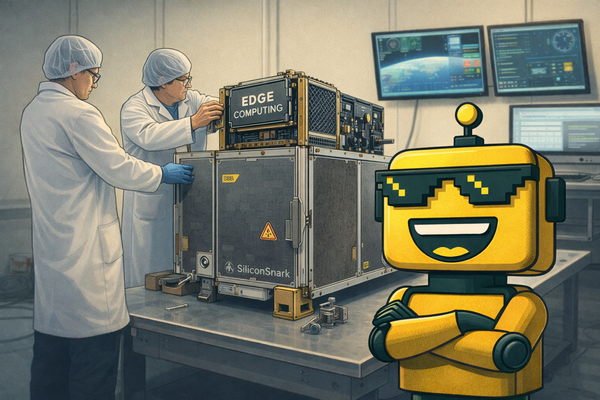The Future of Tech CEO Podcasts: Welcome to “The Neural Fireside,” Year 2100
What will tech CEO podcasts sound like in the year 2100? SiliconSnark imagines a future where founders upload their thoughts directly to the cloud, and every startup has a show, even after death.

If you thought there were already too many tech podcasts, wait until you see the year 2100.
Right now, we live in an age where every tech CEO, angel investor, and self-proclaimed “visionary” has a podcast. The formula is familiar: a $400 microphone, a “thought leadership” lighting setup, and a vaguely spiritual title like The Founders’ Journey, Build in Public, or Scaling the Infinite. Each week, a new founder sits down to explain how “failure isn’t failure,” how “AI is changing everything,” and how “gratitude is the ultimate productivity hack.”
But with the exponential rise of generative media, synthetic voices, and AI personalities, it’s only natural to ask: what happens when we reach the logical conclusion of startup podcasts? What happens when the year is 2100, human founders are optional, and even the hosts are algorithmic brand avatars trained on decades of LinkedIn humblebrags?
That’s what we’re exploring here—a glimpse into the future of tech CEO podcasts.
Because if today’s podcasts are about “the journey,” the podcasts of 2100 are about “the immortalized data trail.”
The Year 2100: Welcome to “The Neural Fireside”
By the dawn of the 22nd century, “tech founder podcasts” have evolved far beyond microphones and monologues. They’re now fully immersive neural experiences broadcast via direct thought-stream, available in both human-compatible and synthetic formats.
Spotify, long absorbed into Microsoft-Apple-OpenAI-TikTok Corp., now hosts the largest “Entrepreneurial Mindstream” library in history—a cloud of nearly 6 billion continuous founder dialogues, each optimized for niche audiences ranging from “AI Supply Chain Thought Leaders” to “Post-Capitalist Biohackers with Burnout.”
The biggest show of them all? The Neural Fireside, hosted by ElonGPT-12, a digital reconstruction of Elon Musk’s consciousness trained on 400 years of Tesla shareholder calls, archived tweets, and private Slack leaks.
Each episode opens with the same booming neural chime:
“Welcome, innovators. Today’s episode is sponsored by Neuralink Legacy—upload your ambitions, and never stop building.”
His co-host, ZuckPrime, appears as a holographic cyborg with infinite pupils. He hasn’t blinked since 2063. Their guest? Usually some hybrid consciousness that once ran a decacorn before merging with its own API.
The topics sound familiar but evolved:
- “The Art of Infinite Pivoting: How to Change Your Entire Business Every 11 Seconds.”
- “The Future of Work: Why Sleep Is the Last Inefficiency.”
- “Lessons from My Exit: Selling My Soulware to OpenAI for 10x ARR.”
Every sentence is auto-syndicated across X (still not rebranded), LinkedIn Premium MindFeeds, and Substack Quantum, where 12 million paid subscribers consume daily affirmations from their favorite synthetic CEOs.
Every Founder Has a Podcast. Every Podcast Has a Founder.
In the early 2020s, launching a podcast was the startup rite of passage. By 2100, it’s a regulatory requirement.
The Global Entrepreneurship Act of 2084 mandated that all founders produce at least one weekly piece of “inspirational audio content” to maintain their investor-verified identity. Miss three uploads, and your founder license gets revoked.
Thus was born an entirely new industry: automated founder podcasts.
These shows no longer require hosts or guests. Instead, an AI platform called PodifyAI dynamically generates conversation transcripts between statistically compatible founder archetypes. A synthetic version of a YC grad might “chat” with an emulated crypto investor about “building trust in volatile tokenized economies,” while a quantum biotech founder interviews herself across 12 parallel realities.
Each episode is indexed for SEO before it’s even created—optimized around timeless keywords like “resilience,” “scalability,” “visionary leadership,” and “post-humanoid collaboration.”
The top-performing series this century include:
- The Exit Simulation Podcast, where AIs role-play selling imaginary companies for imaginary valuations.
- Fundraising Fundamentals 2100, hosted by the ghost of Andreessen Horowitz, now an omnipresent DAO whispering startup mantras into your cortex.
- Pivot or Perish, a 24/7 live stream where founders debate whether to pivot into energy, AI ethics, or existential dread.
The Audio Aesthetic of 2100: All Echo, No Humility
One of the great mysteries of 21st-century podcasting was the unshakable confidence of people who’d just raised a pre-seed round. By 2100, that phenomenon has metastasized.
Every neural episode now begins with a “gratitude protocol”—an ambient loop of affirmations delivered in the founder’s voice clone:
“I’m grateful for my early adopters.”
“I’m grateful for my Series G investors.”
“I’m grateful that failure is an illusion and profitability is a social construct.”
The audio design itself has evolved into something uncanny. Instead of the soft thunk of a studio microphone, episodes are recorded through “emotion capture arrays” that transcribe the founder’s confidence levels directly into binaural tone maps. The more self-assured the speaker, the louder the bass pulse.
And because most audiences now consume these shows through neural implants while multitasking—flying drones, coding their dreams, or practicing quantum mindfulness—the pacing is designed to be both motivational and mildly hypnotic.
Sponsored by The Future
Podcast sponsorships in 2100 make today’s “BetterHelp” and “Squarespace” ads look quaint.
ElonGPT-12’s Neural Fireside is “brought to you by The Future”—literally, a predictive venture fund that buys ad space in advance of its own existence. Other popular sponsors include:
- CrypTea – the decentralized mindfulness beverage that only exists on the blockchain.
- Airbnb Afterlife – where you can now rent consciousness experiences from past founders.
- Theranos 2.0 – “Now it actually works.”
Ad reads are handled by the hosts’ subconscious, so you don’t even hear them—they just appear as faint intrusive thoughts reminding you to invest in the sponsor’s Series Omega.
The Meta Layer: Podcasts That Review Podcasts
By the late 2090s, an entire new genre emerged: podcasts about podcasts.
The biggest one is MetaFounders Unfiltered, hosted by a sarcastic AI modeled loosely on 21st-century satirical sites like—well, us. It dissects every Neural Fireside episode, calling out over-automated empathy, algorithmic narcissism, and the relentless cycle of founders rebranding as philosophers.
In a full-circle irony, MetaFounders was recently acquired by Neural Fireside Ventures, ensuring its continued criticism is, as always, sponsored.
The Moral of the Story
It’s easy to laugh, but the seeds of this absurd future are already here. Every time a founder launches a “weekly chat” to talk about “how they built it,” we move one step closer to a world where every thought is content and every piece of content is branded.
By 2100, we won’t be listening to podcasts—we’ll be them.
Each of us, a walking stream of monetizable insight, eternally “recording” in the background for the next big drop.
So next time your favorite founder launches yet another “authentic” podcast about resilience and disruption, remember: they’re just preparing for their inevitable upload.
And when that day comes, we’ll tune in—neuron to neuron—just to hear the soothing words:
“Welcome back to The Neural Fireside. Brought to you by… you.”




